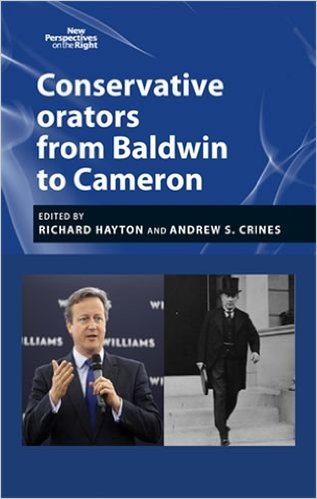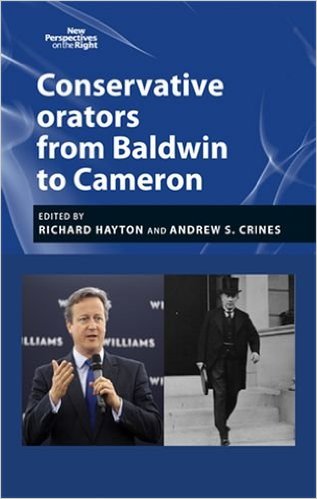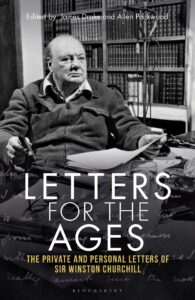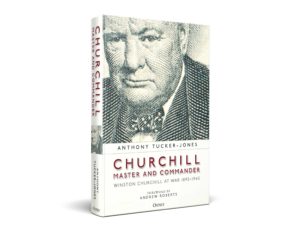Finest Hour 170
Books, Arts & Curiosities – Speaking the Speech

December 3, 2015
Finest Hour 170, Fall 2015
Page 42
Review by Richard Toye
Richard Hayton and Andrew S. Crines, eds., Conservative Orators from Baldwin to Cameron, Manchester University Press, 2015, x + 264 pages, £75.
ISBN 978-0719097249
 In the United States there is a longstanding and very healthy tradition of rhetorical scholarship, which can be traced at least as far back as the founding of the Quarterly Journal of Speech in 1915. Jeffrey Tulis’s book The Rhetorical Presidency (1987) was a landmark, which considered (and was quite critical of) the ways in which modern Presidents had used public speech as a tool of governance. It is only comparatively recently, however, that British historians and political scientists have started to investigate systematically the oratory of UK politicians.
In the United States there is a longstanding and very healthy tradition of rhetorical scholarship, which can be traced at least as far back as the founding of the Quarterly Journal of Speech in 1915. Jeffrey Tulis’s book The Rhetorical Presidency (1987) was a landmark, which considered (and was quite critical of) the ways in which modern Presidents had used public speech as a tool of governance. It is only comparatively recently, however, that British historians and political scientists have started to investigate systematically the oratory of UK politicians.
Conservative Orators is a welcome addition to this growing body of work and complements the editors’ earlier volume on Labour speakers. All the chapters are lucid and well-researched and the introduction and conclusion provide helpful context.
Readers of Finest Hour will, of course, be particularly interested in the chapter on Churchill by Kevin Theakston, author of Winston Churchill and the British Constitution (2004). Ideologically Churchill is rather hard to place. Naturally he deserves to be considered a Conservative orator, but of course he also spent about twenty years in the Liberal Party. In later years, this Liberal identity played a significant part in his rhetoric, as he sought to remind progressively minded voters that he himself had been one of the fathers of the welfare state.
Worth remembering also is that the demands of public speaking changed quite substantially during Churchill’s lifetime. Some things remained constant—such as the need for politicians to be able to deal with hecklers—but the advent of new forms of media created pressures and opportunities that were unknown to the Victorians. All things considered, Churchill (who was fascinated by technology) adjusted pretty well, although never to television.
In the interwar years, though, it was Stanley Baldwin who was the master of the political broadcast, as Andrew Taylor’s chapter on him notes. Churchill, who was largely kept off the BBC during his “wilderness years,” had fewer opportunities to practice, but arguably it was the public’s very lack of familiarity with his style and voice that allowed him to appear fresh and interesting (in contrast to “the old gang”) after the outbreak of the Second World War. Certainly, his broadcasts in 1939–40 as First Lord of the Admiralty helped establish Churchill in the public mind as a potential successor to Neville Chamberlain.
Theakston’s chapter, however, bypasses the war years and focuses on Churchill’s oratory in the years 1945–51. Some readers might find that disappointing, but it is in many ways a wise choice, because it permits a sustained focus on aspects of Churchillian rhetoric that are often neglected. Theakston’s argument about Churchill’s speech-making in this period is simple but compelling. He suggests that “whereas as Leader of the Opposition his preferred approach was to mount thunderous, slashing, and strongly worded attacks on the mistakes and failings of the Labour government, his tone on return to office was more restrained and consensual” (31). Once back in Downing Street, Churchill presented himself almost as a Baldwinian-style societal healer, promising “several years of quiet, steady administration” (39).
Theakston also notes how, as Churchill’s health declined, speech-making became an important way for him to demonstrate to his colleagues and the public that he was still up to the job. Happily for him, prime ministers during that era were not expected to speak outside the House of Commons nearly so often as they are today. This gave him sufficient time to work himself up for periodic set-piece orations, which he prepared with very little assistance. Theakston correctly concludes: “Whatever his other limitations and failings as prime minister for the second time in the 1950s, Churchill remained capable of formidable oratory and stylised public performance pretty much until the final curtain” (46).
There does remain some scope for further research, especially into popular reactions to Churchill’s post-war speeches. Nevertheless, Theakston is to be congratulated on what is a significant contribution to the Churchill literature. Similarly, the collection as a whole deserves praise for its insights into the nature of Conseravtive leadership and British rhetorical culture more generally.
Richard Toye is Professor of History at the University of Exeter. He has written three books about Churchill, including The Roar of the Lion: The Untold Story of Churchill’s World War II Speeches (Oxford, 2013).
Subscribe
WANT MORE?
Get the Churchill Bulletin delivered to your inbox once a month.






